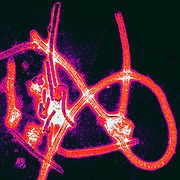
More than a year after its start, the Ebola epidemic in West Africa is still not over. More than 30 new cases are being reported each week and there have been cases in Liberia, where the outbreak had been declared over.
"The battle can be won, but it requires sustained effort, very careful negotiation with communities and perfection in follow-up of everybody who has been a contact," said David Nabarro at a media briefing in Cape Town, South Africa. Nabarro is the United Nations' special envoy for the Ebola epidemic in West Africa.
This outbreak of Ebola is by far the worst ever seen. Although the rate of infections has slowed down Sierra Leone and Guinea, they have never been negligible. Nabarro noted that 30 infections a week would have been considered "a major, major outbreak" before this outbreak. He added that about a third of new cases of the infection are occurring in people who were not on any lists of contacts of people who were already infected.
This epidemic has lead to the deaths of more than 11,000 people since 2013. This is more deaths than all other outbreaks of Ebola combined.
People may be becoming complacent, said Olawale Maiyegun, the social affairs director for the African Union Commission. He noted that one of the main warnings people were told during the height of the epidemic was "ABC" for "avoid body contact" because anyone with Ebola is highly contagious. Yet Maiyegun reported seeing people dancing together in Sierra Leone.
Similarly, there have been reports of difficulties in making people in Guinea and Sierra Leone understand that traditional burial practices, which include family washing the body of the deceased, can spread the virus.



